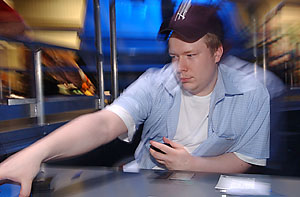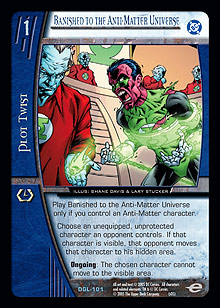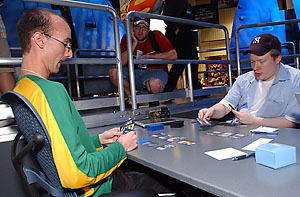 When I had the honor of providing coverage for $10K Hannover, I stumbled across one of my favorite people in the Vs. world. Running a defensive build of Big Brotherhood that focused on making the opponents’ attacks futile and that played no characters before turn four, he took down Kai Budde on his way to a heartbreaking ninth place finish. Well, it was heartbreaking to me, anyway—the player of which I speak is the kind of guy who takes what fate has to dish out with a smile, for better or worse.
When I had the honor of providing coverage for $10K Hannover, I stumbled across one of my favorite people in the Vs. world. Running a defensive build of Big Brotherhood that focused on making the opponents’ attacks futile and that played no characters before turn four, he took down Kai Budde on his way to a heartbreaking ninth place finish. Well, it was heartbreaking to me, anyway—the player of which I speak is the kind of guy who takes what fate has to dish out with a smile, for better or worse.
Meet Germany’s Maik Stich—the hands-down best player you’ve never heard of.
Maybe that’s a bit of an exaggeration—if you’re a longtime reader of my column, you might remember the occasional mention of Stich’s name. Ben Kalman and several others gave me a “Who?” in response to my elation at Stich’s 4-0 record, but Tim Willoughby gave me a solid “Oh, that guy”—so it’s possible a handful of people know him. The “you” in “best player you’ve never heard of” directly applies to the reader, so if Maik is actually reading this right now, my entire system collapses.
But still, he’s awesome, and he’s finally kicking major butt.
I’ve said in the past that there are great deck builders and great players—it’s incredibly rare to find someone like Jason Hager who can do both with seemingly equal proficiency. Stich may have that rare balance—the jury’s still out—but he is one of the greatest and most innovative deck builders I’ve ever seen, and his entry into PC Indy was proof of that.
 Arriving from Germany via plane after almost 20 hours of travel and three stopovers, Stich wasn’t even guaranteed entry into the PC. He grinded in by winning one of the LCQs the night before, and he did so with a cool “Anti-Knights” deck. Similar to the winning deck from $10K Munich, Stich’s deck consisted of a mostly concealed lineup. The twist? Instead of using Quick Kill, it ran Banished to the Anti-Matter Universe, allowing abuse of a variety of double-attackers. Pretty cool stuff.
Arriving from Germany via plane after almost 20 hours of travel and three stopovers, Stich wasn’t even guaranteed entry into the PC. He grinded in by winning one of the LCQs the night before, and he did so with a cool “Anti-Knights” deck. Similar to the winning deck from $10K Munich, Stich’s deck consisted of a mostly concealed lineup. The twist? Instead of using Quick Kill, it ran Banished to the Anti-Matter Universe, allowing abuse of a variety of double-attackers. Pretty cool stuff.
The 25-year-old student from Karlruhe, Germany is a regular gamer who seems to have a great deal of his life invested in the hobby. He’s pursuing a career in the design side of the industry—and with his creativity, realism, passion, and talent, it would seem that he should have little difficulty in reaching his goal. His deck choice for today demonstrated his blend of philosophies:
“It [the Shadow Creatures deck he’d found success with thus far in the PC] is simple enough to play, has a lot of tricks, and has very good deck manipulation. If the opponent doesn’t have the proper measures against it, they might as well just concede.
“I’ve seen plenty of Rot Lop Fan and Speedy, but I’ve still won most of the games anyways. Rot Lop Fan doesn‘t do as much as some would think because I can contain the opponent’s characters before they can get much use out of him. You still need to draw tech—it’s not enough just to have it in your deck. It takes creativity and out-of-the-box plays to take this deck down.
“The Trial By Sword move from Dawson was very intelligent, and a good example. If he had played it after he had declared the attack, I would’ve responded with Kiman and then stunned Dawson’s attacker with Kiman’s other effect, but Dawson played Trial before. So far, that was really my only surprise today. The deck takes a lot of adaptation. If the opponent plays Rot Lop Fan, and you have initiative, you just start attacking as much as you can to rob him of the breakthrough.”
I was curious to ask him what he felt about the metagame here today. He answered, “So far I’ve seen like, only two or three different decks. I know according to some people there are only three decks at any time anyways in this game, but I personally like the idea that this metagame is totally off-curve. It allows for some totally different play.”
I asked if he felt that meant the format required more skill than previous formats or not. He replied, “Decisions, I think, become more difficult to make. At one point, if we each have seven characters, the difficulty becomes more dramatic—there’s so much more to think of. At the same time, a slight mistake might not be dreadful as a result because there are more factors in play to compensate. Whatever the modern age metagame is, I always find it refreshing. I think everything here was obvious. GLEE was already being played in Golden Age. Shadow Creatures had been rumored…There was Blue, but I don’t feel it is consistent enough to be competitive. Still, that’s not a negative thing to me.”
 Since I don’t live in Europe, I was curious about how the game was doing there. I’d been told that comic shops were few and far between in Germany in particular, and that this was a factor in delaying the success of Vs. there until early 2005. To this notion, Stich shook his head: “We have like, three or four comic shops in one city, at least.” He went on to discuss the differences between European and North American metagames, or lack thereof. “The point is that the American and European metagame always have been different for any game. This is slightly different with Vs. just because there is no real German site or anything, no German news source. We see TCGPlayer, see Metagame, and we read the articles, so I think it’s sort of the same since both Europe and North America read the same things. You have players that do well in one continent doing well in the others right now, especially if the environment is as limited as it currently is. There only are that many metagame choices you can currently do. Comic stores aren’t really a factor, and I feel the worldwide environments are more similar than some may believe.”
Since I don’t live in Europe, I was curious about how the game was doing there. I’d been told that comic shops were few and far between in Germany in particular, and that this was a factor in delaying the success of Vs. there until early 2005. To this notion, Stich shook his head: “We have like, three or four comic shops in one city, at least.” He went on to discuss the differences between European and North American metagames, or lack thereof. “The point is that the American and European metagame always have been different for any game. This is slightly different with Vs. just because there is no real German site or anything, no German news source. We see TCGPlayer, see Metagame, and we read the articles, so I think it’s sort of the same since both Europe and North America read the same things. You have players that do well in one continent doing well in the others right now, especially if the environment is as limited as it currently is. There only are that many metagame choices you can currently do. Comic stores aren’t really a factor, and I feel the worldwide environments are more similar than some may believe.”
He had some interesting thoughts to present about the quality of players in Germany and one of the unique advantages they have. “I cannot speak authoritatively for Vs., but for all the other TCGs I know, usually we have as many good players as USA has. The advantage is that we are not that spread out. We can all reach each other within one or two hours, and we have skillful people that can reach each other without traveling for eight hours. That’s a big strength. There’s always the American attitude towards Europeans, regardless of what game, and though there is always an attitude from some people, you can’t argue with success. If we Germans play, we don’t tend to play at the casual level. If we play anything, we get ten boxes and we play it seriously.
“We try to help newcomers too. That makes a big difference. You have a bigger pool of ideas and experience to draw upon, and that’s really helpful at the international level.”
I asked him if he had any final thoughts. He mulled the challenge over for a moment, and then settled on this: “People, even though they play for money, should still try to play [for] fun. They should make sure it’s fun to play against them. Everyone makes mistakes from time to time. The PC is still fun to me, even though it’s for money. It’s a game.”
Maik Stich is a player to watch in the future—a gifted deck builder who’s always on the cutting edge. His skill is tempered by creativity, and his ambition and strength are tempered by general friendliness. His resourcefulness and adaptive abilities should serve him well in the next day of the PC, for which he is now a lock.